Elevate to Escalate: Volkswagen Golf Alltrack Is Crushing Golf SportWagen
It’s no Subaru Outback, soaring toward the top of sales charts with all the force of an automaker riding a decade-long wave of rapid U.S. growth. But the Volkswagen Golf Alltrack, launched in the United States last autumn, is steadily earning a place as the most important Volkswagen wagon. By far.
In fact, the Golf Alltrack is quickly becoming the bright spot in Volkswagen of America’s Golf lineup and the Volkswagen brand’s overall hierarchy. Not surprisingly, the Alltrack is also dimming the spotlight previously shone upon the Golf SportWagen.
Predictably, total U.S. sales of the entire Volkswagen Golf family slipped in 2016, yet total Golf sales began to soar late in the year and have risen 54 percent over the last three months, due in large part to the Alltrack’s early success.
The Volkswagen brand’s recent U.S. sales recovery is artificially enhanced by horrendous results following the diesel emissions scandal. Sales across the brand have increased in each of the last four months, year-over-year, but that’s only because of how awful the results were during the year-ago period.
Go back to the winter of 2012-2013, when Volkswagen had just reported a 39-year sales high in the United States, and brand-wide volume was 22-percent stronger than it is now.
Year-over-year, U.S. sales of the low-rise Golf SportWagen haven’t cratered, but again, sales of the SportWagen were already unexpectedly low following the launch of a diesel-friendly car that didn’t go quite according to plan. Six months into its run, the Golf SportWagen lost the diesel engine that was expected to produce 80 percent of its sales.
Undeniably, the Alltrack has taken over as the primary wagon of choice in Volkswagen’s U.S. showrooms after Volkswagen followed a formula Subaru created two decades ago, a formula that eventually killed off the Legacy wagon.
In Volkswagen’s case, standard all-wheel drive, less than an inch of additional ride height, and slivers of dark cladding under the bumpers, around the wheelarches, and along the sills are all that were required for the Alltrack to now produce 72 percent of all Golf SportWagen sales.
In fact, the Alltrack’s share of the Golf wagon’s volume has grown every month since its September launch, from 14 percent in September to 55 percent in December to 72 percent in February 2017.
Over the last three months, the Alltrack, exclusively available with the 1.8-liter turbocharged four-cylinder, has generated nearly one-quarter of all Golf volume, easily outselling the Golf 1.8T in the process.
While the Alltrack has certainly eaten into the regular SportWagen’s territory, even with the SportWagen offering the Alltrack’s all-wheel drive in the basic S trim level, total wagon sales at Volkswagen have shot through the roof at Volkswagen. The last quarter resulted in 7,473 total Golf SportWagen/Alltrack sales in the United States, more than triple the total achieved one year earlier.
Comparisons with the Subaru Outback aren’t entirely unfair, of course, but the Outback’s level of success is so far removed from Volkswagen’s wagons that the contrast lacks proper perspective for the Volkswagen duo.
In just the first one-sixth of 2017, Subaru has already reported 26,663 Outback sales in America, enough to make the Outback Subaru’s best-selling product and America’s 23rd-best-selling vehicle. In any given month, Subaru sells more Outbacks than Volkswagen sold SportWagens and Alltracks — combined — in the last six months.
The Outback didn’t become America’s 23rd-best-selling vehicle overnight, nor will the Golf Alltrack, 6,404 of which have been sold since September.
But as the Alltrack trends upward, perhaps the most positive sign for Volkswagen is America’s willingness to consider a Volkswagen crossover-esque wagon. This does not bode poorly for the new Tiguan and Atlas.
Timothy Cain is the founder of GoodCarBadCar.net, which obsesses over the free and frequent publication of U.S. and Canadian auto sales figures. Follow on Twitter @goodcarbadcar and on Facebook.
More by Timothy Cain
Latest Car Reviews
Read moreLatest Product Reviews
Read moreRecent Comments
- Varezhka I have still yet to see a Malibu on the road that didn't have a rental sticker. So yeah, GM probably lost money on every one they sold but kept it to boost their CAFE numbers.I'm personally happy that I no longer have to dread being "upgraded" to a Maxima or a Malibu anymore. And thankfully Altima is also on its way out.
- Tassos Under incompetent, affirmative action hire Mary Barra, GM has been shooting itself in the foot on a daily basis.Whether the Malibu cancellation has been one of these shootings is NOT obvious at all.GM should be run as a PROFITABLE BUSINESS and NOT as an outfit that satisfies everybody and his mother in law's pet preferences.IF the Malibu was UNPROFITABLE, it SHOULD be canceled.More generally, if its SEGMENT is Unprofitable, and HALF the makers cancel their midsize sedans, not only will it lead to the SURVIVAL OF THE FITTEST ones, but the survivors will obviously be more profitable if the LOSERS were kept being produced and the SMALL PIE of midsize sedans would yield slim pickings for every participant.SO NO, I APPROVE of the demise of the unprofitable Malibu, and hope Nissan does the same to the Altima, Hyundai with the SOnata, Mazda with the Mazda 6, and as many others as it takes to make the REMAINING players, like the Excellent, sporty Accord and the Bulletproof Reliable, cheap to maintain CAMRY, more profitable and affordable.
- GregLocock Car companies can only really sell cars that people who are new car buyers will pay a profitable price for. As it turns out fewer and fewer new car buyers want sedans. Large sedans can be nice to drive, certainly, but the number of new car buyers (the only ones that matter in this discussion) are prepared to sacrifice steering and handling for more obvious things like passenger and cargo space, or even some attempt at off roading. We know US new car buyers don't really care about handling because they fell for FWD in large cars.
- Slavuta Why is everybody sweating? Like sedans? - go buy one. Better - 2. Let CRV/RAV rust on the dealer lot. I have 3 sedans on the driveway. My neighbor - 2. Neighbors on each of our other side - 8 SUVs.
- Theflyersfan With sedans, especially, I wonder how many of those sales are to rental fleets. With the exception of the Civic and Accord, there are still rows of sedans mixed in with the RAV4s at every airport rental lot. I doubt the breakdown in sales is publicly published, so who knows... GM isn't out of the sedan business - Cadillac exists and I can't believe I'm typing this but they are actually decent - and I think they are making a huge mistake, especially if there's an extended oil price hike (cough...Iran...cough) and people want smaller and hybrids. But if one is only tied to the quarterly shareholder reports and not trends and the big picture, bad decisions like this get made.



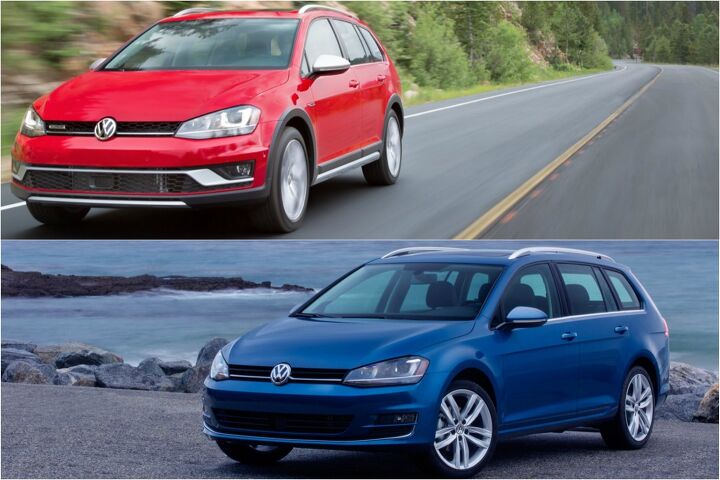
















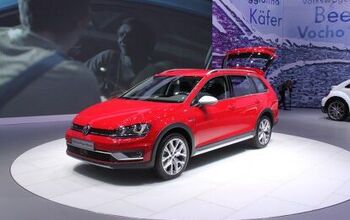
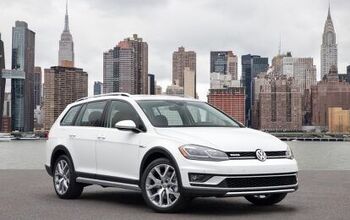




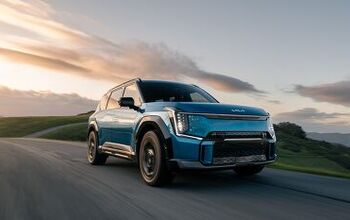







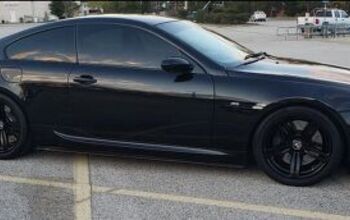
Comments
Join the conversation
What a shock, said no one ever.
They had 3 sitting on the VW lot a few weeks ago. Our VW dealership is also a Mazda dealership, and I was getting our CX-5 an oil change. 2 of them were north of 33K and one was just over 30K. Pretty well loaded. They only had 1 sportwagen on the lot, and it was just over 24K, but was selling for 21K. While the interior was slightly better in the loaded Alltrack, I couldn't justify the price difference. Both had the 1.8T. Also, given the DSG and the 40K service at 695 dollars at the dealer, I'll pass. The new CX-5 seems more appealing.